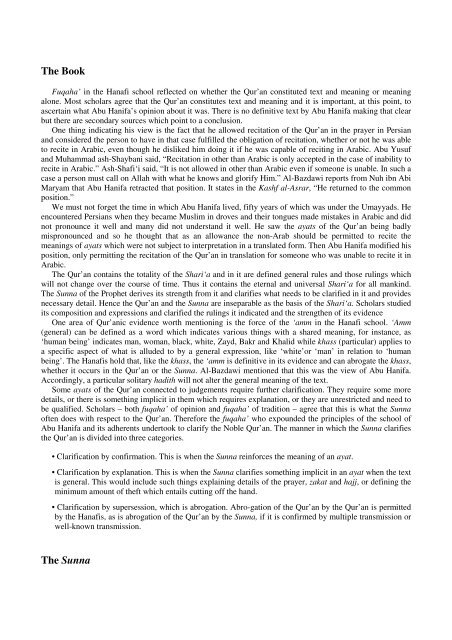You also want an ePaper? Increase the reach of your titles
YUMPU automatically turns print PDFs into web optimized ePapers that Google loves.
The Book<br />
Fuqaha’ in the Hanafi school reflected on whether the Qur’an constituted text <strong>and</strong> meaning or meaning<br />
alone. Most scholars agree that the Qur’an constitutes text <strong>and</strong> meaning <strong>and</strong> it is important, at this point, to<br />
ascertain what <strong>Abu</strong> <strong>Hanifa</strong>’s opinion about it was. There is no definitive text by <strong>Abu</strong> <strong>Hanifa</strong> making that clear<br />
but there are secondary sources which point to a conclusion.<br />
One thing indicating his view is the fact that he allowed recitation of the Qur’an in the prayer in Persian<br />
<strong>and</strong> considered the person to have in that case fulfilled the obligation of recitation, whether or not he was able<br />
to recite in Arabic, even though he disliked him doing it if he was capable of reciting in Arabic. <strong>Abu</strong> Yusuf<br />
<strong>and</strong> Muhammad ash-Shaybani said, “Recitation in other than Arabic is only accepted in the case of inability to<br />
recite in Arabic.” Ash-Shafi‘i said, “It is not allowed in other than Arabic even if someone is unable. In such a<br />
case a person must call on Allah with what he knows <strong>and</strong> glorify Him.” Al-Bazdawi reports from Nuh ibn Abi<br />
Maryam that <strong>Abu</strong> <strong>Hanifa</strong> retracted that position. It states in the Kashf al-Asrar, “He returned to the common<br />
position.”<br />
We must not forget the time in which <strong>Abu</strong> <strong>Hanifa</strong> lived, fifty years of which was under the Umayyads. He<br />
encountered Persians when they became Muslim in droves <strong>and</strong> their tongues made mistakes in Arabic <strong>and</strong> did<br />
not pronounce it well <strong>and</strong> many did not underst<strong>and</strong> it well. He saw the ayats of the Qur’an being badly<br />
mispronounced <strong>and</strong> so he thought that as an allowance the non-Arab should be permitted to recite the<br />
meanings of ayats which were not subject to interpretation in a translated form. Then <strong>Abu</strong> <strong>Hanifa</strong> modified his<br />
position, only permitting the recitation of the Qur’an in translation for someone who was unable to recite it in<br />
Arabic.<br />
The Qur’an contains the totality of the Shari‘a <strong>and</strong> in it are defined general rules <strong>and</strong> those rulings which<br />
will not change over the course of time. Thus it contains the eternal <strong>and</strong> universal Shari‘a for all mankind.<br />
The Sunna of the Prophet derives its strength from it <strong>and</strong> clarifies what needs to be clarified in it <strong>and</strong> provides<br />
necessary detail. Hence the Qur’an <strong>and</strong> the Sunna are inseparable as the basis of the Shari‘a. Scholars studied<br />
its composition <strong>and</strong> expressions <strong>and</strong> clarified the rulings it indicated <strong>and</strong> the strengthen of its evidence<br />
One area of Qur’anic evidence worth mentioning is the force of the ‘amm in the Hanafi school. ‘Amm<br />
(general) can be defined as a word which indicates various things with a shared meaning, for instance, as<br />
‘human being’ indicates man, woman, black, white, Zayd, Bakr <strong>and</strong> Khalid while khass (particular) applies to<br />
a specific aspect of what is alluded to by a general expression, like ‘white’or ‘man’ in relation to ‘human<br />
being’. The Hanafis hold that, like the khass, the ‘amm is definitive in its evidence <strong>and</strong> can abrogate the khass,<br />
whether it occurs in the Qur’an or the Sunna. Al-Bazdawi mentioned that this was the view of <strong>Abu</strong> <strong>Hanifa</strong>.<br />
Accordingly, a particular solitary hadith will not alter the general meaning of the text.<br />
Some ayats of the Qur’an connected to judgements require further clarification. They require some more<br />
details, or there is something implicit in them which requires explanation, or they are unrestricted <strong>and</strong> need to<br />
be qualified. Scholars – both fuqaha’ of opinion <strong>and</strong> fuqaha’ of tradition – agree that this is what the Sunna<br />
often does with respect to the Qur’an. Therefore the fuqaha’ who expounded the principles of the school of<br />
<strong>Abu</strong> <strong>Hanifa</strong> <strong>and</strong> its adherents undertook to clarify the Noble Qur’an. The manner in which the Sunna clarifies<br />
the Qur’an is divided into three categories.<br />
• Clarification by confirmation. This is when the Sunna reinforces the meaning of an ayat.<br />
• Clarification by explanation. This is when the Sunna clarifies something implicit in an ayat when the text<br />
is general. This would include such things explaining details of the prayer, zakat <strong>and</strong> hajj, or defining the<br />
minimum amount of theft which entails cutting off the h<strong>and</strong>.<br />
• Clarification by supersession, which is abrogation. Abro-gation of the Qur’an by the Qur’an is permitted<br />
by the Hanafis, as is abrogation of the Qur’an by the Sunna, if it is confirmed by multiple transmission or<br />
well-known transmission.<br />
The Sunna














